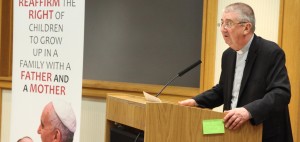
By Sarah Mac Donald - 25 March, 2015

Archbishop Diarmuid Martin gives his address on the theme ‘The Teaching of the Church on Marriage Today’. Pic John McElroy.
The archdiocese of Dublin has said recent newspaper reports which claimed that Archbishop Diarmuid Martin had called on the Government to consider introducing a conscience clause ahead of the marriage referendum are inaccurate.
On Tuesday, a transcript of the Archbishop’s response to a question at last week’s Iona Institute talk at which Dr Martin gave an address on marriage and the family was circulated to the media.
The transcript stated that the Archbishop had limited his comments to the broad issue of freedom of conscience, without making any specific proposals in the context of the upcoming referendum.
Following his address on the theme ‘The Teaching of the Church on Marriage Today’ last Thursday evening in Dublin, the Archbishop was asked about Christian businesses which feel unable to provide services to same-sex couples due to their belief in the sanctity of marriage.
Responding, the Archbishop said, “I think freedom of conscience is probably one of the most very fundamental of all human rights, because it touches the very depths of a person in their identity and we have to redevelop a sensitivity to what that means.”
“We look, for example, to totalitarian regimes and the difficulties people had to express their freedom of conscience and the courage many people had to do that.”
“And in many ways, even in the very repressive regimes, there were some people of courage who were not afraid to raise their voices. They’re the ones who will be remembered; they are the ones who will have changed society.”
“Here, we have and in this I agree, not just in the media, but in political culture, there is a culture of sound bites, a culture of quick answers, of one liners which doesn’t foster this idea of people being able to reflect, express and develop their conscience.”
“We have problems and we have seen it in the inconsistency, for example somebody said ‘religious solemnisers won’t be forced to celebrate gay marriages.’ Now what is that saying? It’s saying, ‘OK there is a conscientious question and we respect the conscience of religious solemnisers; mainly priests.”
“What about a Christian in civil society; a lay Christian who has the same difficulties? Does he have freedom of conscience? Or is his freedom of conscience different to mine as a priest? I don’t believe that.”
“Ok, now people will say if you are paid by the State, you have to do what the State tells you. That isn’t in the long term…. that isn’t even what democracy is about. So, I do believe we have to stress that.”
“The other side is that we have to respect the freedom of expression of others who may disagree with us, but I think this question of freedom of conscience is being pushed aside in debate and we are getting very superficial answers about the way it is being addressed in our society, and I believe that is a much more serious problem.”
The Archbishop said he was noticing increasing dissatisfaction and uncertainty about politics.
“People are losing confidence in the political process. It is because politicians and political parties are becoming more and more insensitive to the way people are thinking and they are not carrying out this process of mediation between the needs of the community and the views and desires of citizens.”
“When we move into that type of politics, I believe society is being damaged. I believe that respect for conscience is a way that politics shows its respect for the citizens who built up that. And I believe that in the area of freedom of conscience, freedom of religious expression is also one of the most fundamental rights that have to be preserved.”